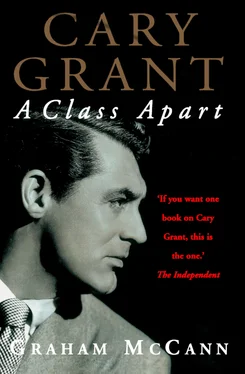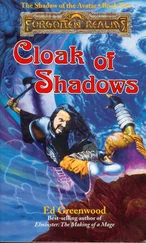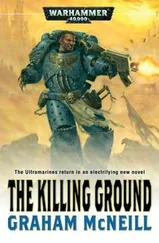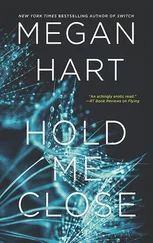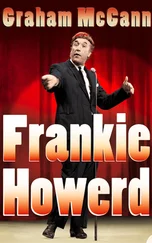Cary Grant was born, in effect, on 7 December 1931, 10 the day that he signed his Paramount contract and consigned ‘Archie Leach’ to relative – but by no means complete – obscurity at the age of twenty-seven years and eleven months. Cary Grant was not a new man, but rather a young one with the rare opportunity to restyle himself in a manner which would suit his aspirations. The name change itself was a fairly routine, pragmatic decision by the studio; it was not intended as an invitation to Archie Leach to embark on any profound voyage of self-discovery. Paramount had already decided who Cary Grant should be: a cut-price, younger, dark-haired substitute for Gary Cooper. 11 Cooper had joined Paramount in 1927; by 1931, he was complaining that he was being worked too hard. While he was filming City Streets that year, he suffered a near collapse from the combined effects of jaundice and exhaustion. When the movie had been completed, he left for Europe, and began to spend more time with the Countess Dorothy di Frasso than his studio felt was desirable. Archie Leach, smoothed out into the more refulgent form of ‘Cary Grant’, was to be used to remind Cooper – gently at first – that he was not quite as distinctive nor as valuable as he might have thought he was. The two men did have a number of things in common: both had English backgrounds (Cooper’s parents were both English, and he had been educated in Bedfordshire 12 ); both were physically powerful men who could also show their vulnerability; and both were versatile enough to play comic as well as romantic roles.
Cary Grant, it was reasoned, could be groomed for stardom by taking the ‘Gary Cooper roles’ that Gary Cooper turned down, and, by playing on the perceived similarity between the two men, Paramount hoped that Cooper’s ego could be held in check by the constant presence of a possible replacement at the studio. A fan magazine of the time – possibly with some covert encouragement from Paramount’s publicists – noted that ‘Cary looks enough like Gary to be his brother. Both are tall, they weigh about the same, and they fit the same sort of roles.’ 13 Cooper had been warned. It was a common tactic employed by all studios at the time to prevent their most popular stars from becoming too ‘difficult’: Metro-Goldwyn-Mayer, for example, had brought in James Craig as a threat to Clark Gable, and Robert Young as a threat to Robert Montgomery. It was good insurance. If Gary became too demanding, Cary could take over (only a modest dash would need to be erased on the dressing-room door); it was considered unlikely, and, as often happened in similar cases elsewhere, it was probably thought more likely that Cary Grant would become a useful romantic lead in a string of relatively modest movies.
Cary Grant, however, had a quite different outlook on the possibilities opened up by his sudden change of identity. He did not wish to live indefinitely within quotation marks; he wanted to create a ‘Cary Grant’ that he could grow into. Whoever this ‘Cary Grant’ was to be, he would have to be someone who seemed real to Archie Leach as well as to others: ‘If I couldn’t clearly see out, how could anyone see in?’ 14 All that he started with, he admitted, was a façade, and ‘the protection of that façade proved both an advantage and a disadvantage’. 15 It offered him both the chance to change and an excuse not to change. Archie Leach wanted to change. The playwright Moss Hart remembers him back in his New York days, mixing with a group of ‘have nots’ at Rudley’s Restaurant on 41st Street and Broadway. According to Hart, Archie Leach had appeared to be ‘a disconsolate young actor’ whose ‘gloom was forever dissipated when he changed his name to Cary Grant’. 16
Archie Leach saw his reincarnation as ‘Cary Grant’ not as the end of his self-reinvention but rather as the start of it. The writer Sidney Sheldon, who came to know and work with Grant in the forties, used him as the prototype for Rhys Williams, a character in the novel Bloodline ; Williams is described as ‘an uneducated, ignorant boy with no background, no breeding, no past, no future’, but, with ‘imagination, intelligence and a fiery ambition’, he transforms himself from ‘the clumsy, grubby little boy with a funny accent’ into a ‘polished and suave and successful’ man. 17 Archie Leach was eager to learn, to absorb as much as he could from the places and people he encountered. His lack of formal education remained one of his lifelong regrets. 18 Since his arrival in the US, he had made a point of making the acquaintance of people who were gifted and highly educated. Rather like the character in Bloodline , he ‘was like a sponge, erasing the past, soaking up the future’. 19 He was not ashamed of his working-class background, but he did want to take every opportunity to pursue the project of self-improvement; he was, in part, eager to educate himself, but also he was reacting, with bitterness, to the memory of the routine humiliations suffered by himself, his family and his friends back in England. He studied other people’s dress sense, table manners, gestures and accents. He was not going to be ‘caught out’. The composer Quincy Jones, who formed a friendship with him in later years, remarked that when he was growing up, ‘the upper-class English viewed the lower classes like black people. Cary and I both had an identification with the underdog. My perception is that we could be really open with each other because there was a serious parallel in our experience.’ 20 John Forsythe, who acted alongside him in the forties, made a similar point: Archie Leach had been ‘a poor kid. He did scrape his way to the top. That meticulous quality he had – knowing how to best use himself – was one of the key things to his nature.’ 21
The idea of America – its promise of liberty and equality – inspired Archie Leach, as it had inspired many other English people from similar backgrounds. Betsy Drake, who became Cary Grant’s third wife, recalled that ‘in Cary’s day you got nowhere – no where – with a lower-class accent. The fact that he survived all that speaks very well for him.’ 22 Though America had its own casual snobberies, it was, none the less, considerably more democratic in outlook and disposition than the England that Archie Leach had grown up in. Categories in England were particularly rigid then, and social distinctions emphatically made and scrupulously preserved. In America, on the other hand, Archie Leach could, to some extent, avoid such potential disadvantages. Only an expert in contemporary English class distinctions could have contemplated slotting him firmly into a particular niche; to most people he was just a good-looking and personable young man.
Archie Leach had some sense of what kind of person he wanted Cary Grant to be. Glamorous, for instance. Archie Leach wanted Cary Grant to be the epitome of masculine glamour. To this end his first chosen role-model was Douglas Fairbanks. He had met Fairbanks before he even set foot in America. Fairbanks and his wife, Mary Pickford, had been passengers on the RMS Olympic on the same voyage to the US as Archie Leach and the rest of the Pender troupe. The couple were returning to America after their much-publicised six-week honeymoon in Europe. Fairbanks fascinated Archie Leach. Tall, dark and handsome, an international screen idol, a ‘self-made man’ (with just a little help from Harvard), a fine athlete and, as his young admirer noted, ‘a gentleman in the true sense of the word. A gentle man. Only a strong man can be gentle.’ 23 Archie Leach was thoroughly impressed by Fairbanks, off screen as well as on; Fairbanks symbolised the kind of man – and star – that the then still somewhat gauche teenage Archie Leach wanted one day to become. What is more, Archie knew enough of Fairbanks’s biography, gleaned from movie magazines and newsreels, to see that they had much in common: disrupted and largely unhappy childhoods, alcoholic fathers, acrobatic training, apparently limitless high spirits and a capacity to enjoy their own good luck. Fairbanks had triumphed; he had achieved fame, wealth and power, as well as marrying ‘America’s sweetheart’. 24 ‘For a man coming out of darkness into light,’ commented the critic Richard Schickel, ‘there was, possibly, a promise in Fairbanks.’ 25
Читать дальше
